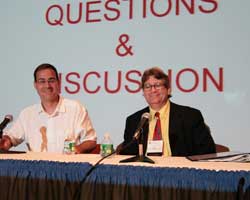SSW
Conference Keynoter Addresses Treating Veterans' Mental Health

Lt. Col. Carl Castro
(left) and Lt. Col. Mark Chapin answer questions following
their conference talks on June 26. |
NORTHAMPTON, Mass. – A
U.S. Army colonel, whose research documented the psychological
effects of tours in Iraq and Afghanistan on more than 6,200
soldiers, offered lessons for mental health workers now
treating veterans of those wars.
Lt. Col. Carl Castro, director
of military operations in the medical research program
at Fort Detrick, Md., addressed a capacity crowd at the
start of the three-day national conference “Combat
Stress: Understanding the Challenges, Preparing for the Return,” organized
by the Smith College School for Social Work and the organization “Give
an Hour.”
“Mental health training [for soldiers] works,” said
Castro, referring to the preparation known in the military
as battlemind training. “This is where I think mental
health workers can do the most in advance.”
Three months after their return from deployment, soldiers
who had received battlemind training reported fewer symptoms
of post-traumatic stress disorder (PTSD) and fewer sleep
problems than those who received standard stress education,
said Castro.
Castro delivered the first
talk of the conference, which celebrates the
School for Social Work’s longstanding
dedication to the treatment of war veterans. The school was
founded in 1918 to train mental health workers to address “shell
shock” experienced by World War I soldiers. It currently
offers a full scholarship to a member of the military who
wants to treat veterans.
The need is real. According
to recent reports, more than 300,000 members of the U.S.
military are now experiencing PTSD, and
another 320,000 have most likely experienced a traumatic
brain injury. Earlier this year, the Army reported that the
suicide rate among the enlisted is at a 26-year high.
None of the military branches had any standardized battlemind
training at the start of the U.S. action in Afghanistan and
Iraq, said Castro, noting that has since changed.
Castro’s research also indicated the military needs
to provide training on responding to the moral and ethical
challenges that service members will undoubtedly face in
regard to the treatment of noncombatants. Training for mid-level
military leaders is also a necessity because service members’ confidence
in those leaders – the people from whom they receive
orders on a daily basis – can reduce the impact of
combat trauma.
Castro touched upon another
widely reported issue surrounding ongoing military efforts:
repeated redeployments. The mental health adjustment that
takes place in a solider returning from battle takes longer
than 12 months, he said, which means it does not occur
by the time many soldiers are redeployed.
Further, the longer the
duration of multiple deployments, the more likely they
are to lead to mental health problems. “You
are not going to harden soldiers by exposing them to the
horrors of combat,” he said.
Castro’s remarks
resonated both personally and professionally with many
of those wearing their military uniforms in the audience.
“I think one of the biggest issues is getting people
to accept care,” said Capt. Robert Williams, a social
worker in the Air Force in Spokane, Wash., who has twice
been deployed in recent years. “The persona of the
military is ‘I take care of other people.’ We
are not good at taking care of ourselves.”
|























